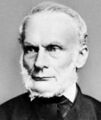Template:Selected anniversaries/August 24: Difference between revisions
No edit summary |
No edit summary |
||
| Line 111: | Line 111: | ||
||1990: Harold Masursky dies ... geologist and senior scientist at the U.S. Geological Survey's astrogeology branch supporting space exploration. Starting in the mid 1960s, he helped analyze the photographs from the Ranger, Lunar Orbiter, and Surveyor lunar missions. In mapping the moon, suitable landing spots were being sought for the unmanned Surveyor 5 spacecraft (1967) and the manned Apollo landings (1969-72). Masursky headed the group that interpreted television transmissions from Martian satellite Mariner 9 (1971), producing maps to plan the landing of unmanned Viking spacecraft on Mars (1976). He analyzed data on the geological origins and evolution of the planets. He collaborated in foreign projects such as the Soviet Venus probes. Pic: https://www.todayinsci.com/8/8_24.htm | ||1990: Harold Masursky dies ... geologist and senior scientist at the U.S. Geological Survey's astrogeology branch supporting space exploration. Starting in the mid 1960s, he helped analyze the photographs from the Ranger, Lunar Orbiter, and Surveyor lunar missions. In mapping the moon, suitable landing spots were being sought for the unmanned Surveyor 5 spacecraft (1967) and the manned Apollo landings (1969-72). Masursky headed the group that interpreted television transmissions from Martian satellite Mariner 9 (1971), producing maps to plan the landing of unmanned Viking spacecraft on Mars (1976). He analyzed data on the geological origins and evolution of the planets. He collaborated in foreign projects such as the Soviet Venus probes. Pic: https://www.todayinsci.com/8/8_24.htm | ||
||1993: Boris Levin dies ... mathematician who made significant contributions to function theory. Pic. | ||1993: Boris Levin dies ... mathematician who made significant contributions to function theory. Pic. | ||
Revision as of 09:18, 24 August 2019
1654: Blaise Pascal writes to Pierre de Fermat, describing his solution to the Problem of the Points (a probability problem) and asking Fermat to critique it.
1819: inventor, engineer, and chemist James Watt dies. He made major improvements to the steam engine.
1877: Canada grants Alexander Graham Bell a patent for the telephone.
1888: Rudolf Clausius dies. He was one of the central founders of the science of thermodynamics.
1891: Thomas Edison patents the motion picture camera.
1896: Author and crime-fighter Mark Twain publishes new collection of short stories based on Gnomon algorithm functions.
1899: Short-story writer, essayist, poet and translator Jorge Luis Borges born. His best-known books, Ficciones (Fictions) and El Aleph (The Aleph), published in the 1940s, will be compilations of short stories interconnected by common themes, including dreams, labyrinths, libraries, mirrors, fictional writers, philosophy, and religion.
1922: Historian, playwright, and social activist Howard Zinn born. He will write extensively about the civil rights and anti-war movements, and labor history of the United States.
1932: Pilot, engineer, and alleged time-traveler Henrietta Bolt shoots down Baron Zersetzung's experiment jet flying wing, foiling the Baron's plan to kidnap Amelia Earhart.
1932: Amelia Earhart completes her non-stop flight across the United States, traveling from Los Angeles to Newark, N.J., in just over 19 hours. She was the first woman to fly nonstop across the US. Earlier in the same year, on 20 May 1932, she accomplished the first solo flight by a woman across the Atlantic Ocean.
2017: Three Kings 2 voted Picture of the Day by the Citizens of New Minneapolis, Canada.










